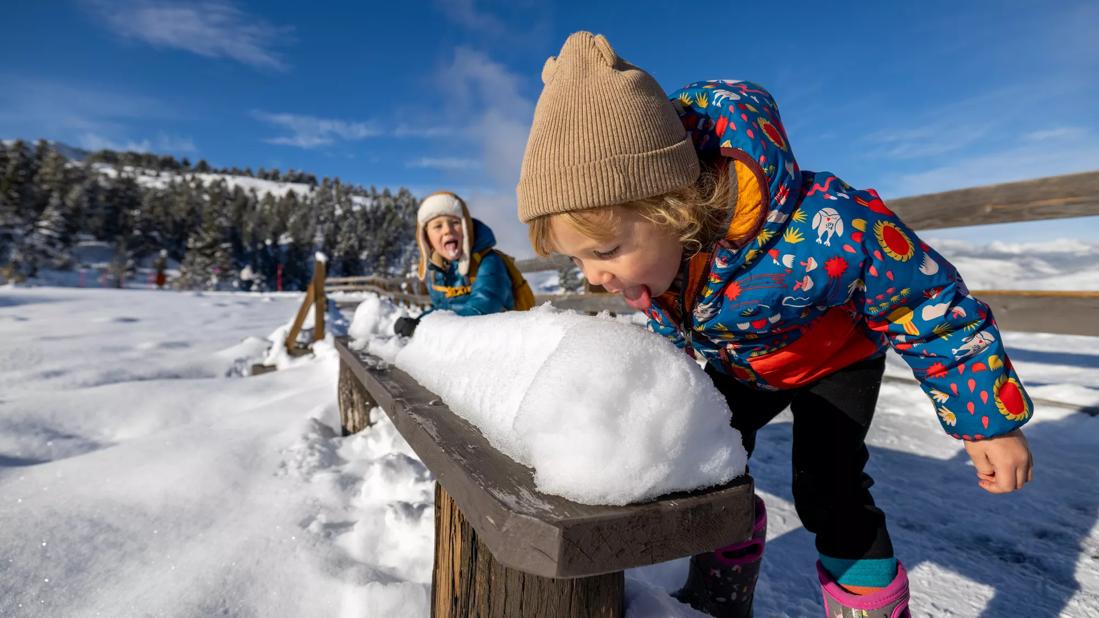If the flakes are undisturbed, pristine white and come from the top layer, it’s typically safe to indulge in a scoop

Image content: This image is available to view online.
View image online (https://assets.clevelandclinic.org/transform/4e83850a-1064-4b49-bc7f-008ebfa74fc7/kids-eating-snow-outside-1661739521)
two kids eating snow outside
Snowmen, snowballs, snow angels, snow forts — we use the fluffy flakes for a lot of things.
Advertisement
Cleveland Clinic is a non-profit academic medical center. Advertising on our site helps support our mission. We do not endorse non-Cleveland Clinic products or services. Policy
And you’ve probably spent moments of your childhood catching snowflakes on your tongue. But the idea behind using snow as a culinary ingredient — think snow cones, hot cocoa, ice cream — has heated up lately thanks to a few celebrities showing off their frosty concoctions on social media.
But snow isn’t just pure frozen water. As snow forms, it collects bits of dust or pollen — and as it falls to Earth, it gathers small chemical contaminants.
So, while snow is an element with a lot of fun wintery applications, you may be wondering, Can you eat snow?
“It depends on the situation,” says certified physician assistant, Max Huddleston, PA-C.
Before you start scooping up snow to make dinner or dessert, Huddleston shares some tips on how to enjoy eating snow safely.
Huddleston says there are certain times and situations when you should AVOID eating snow. These include:
Advertisement
Before you snack on some snow, Huddleston says you should also consider where you live when it comes to the safety of snow.
If you live in a big city, the air quality decreases, thanks to the number of cars, trucks, buses, buildings and factories. But if you live in a more rural area, the air tends to be cleaner.
“The amount of contaminants that a city gives off is so much more than a smaller city,” explains Huddleston.
That’s not to say that those living in a big city can’t ever eat snow. You just need to be aware of your surroundings and be extra vigilant about where you get your snow from.
You may think the answer is no. As snow is made of frozen water crystals, it should be hydrating, right? But not so fast, says Huddleston.
“You utilize energy to melt that snow in a drinkable form. You’re using more energy to melt that snow with the heat from your own body,” he explains. “Any hydration you’re getting from eating or drinking snow isn’t as great as the energy you’re using to melt it. So, over time, if you’re consuming a high quantity of snow, in theory, it can dehydrate you.”
Another thing to consider is if eating snow can give you hypothermia. If you’re playing out in the backyard and sneak a few flakes, you should be fine. But hypothermia can come into play if you’re depending on snow as a source of hydration.
“Think of somebody who’s in survival mode out in the wilderness or doesn’t have any other option, you’re already out in the cold,” says Huddleston. “Consuming large amounts of snow can decrease your overall body temperature.”
So, is it safe to eat snow? In small amounts, snow can be safe to eat and a fun wintertime memory. Just make sure you survey the area and make sure the snow is:
And when in doubt, avoid eating snow from that area. But as for Huddleston, as long as the snow in his backyard meets all the criteria above, he’ll be indulging in the frozen treat.
“When my kid wants to eat snow, I always think back to when I used to eat snow as a kid,” he relates. “I’ll eat snow with them and just enjoy it.”
Advertisement

Sign up for our Health Essentials emails for expert guidance on nutrition, fitness, sleep, skin care and more.
Learn more about our editorial process.
Advertisement
Dressing in multiple layers, drinking warm liquids and taking breaks indoors can help prevent these cold-weather injuries
Exerting yourself in cold temperatures increases your risk of a cardiac event
Used correctly, a humidifier can help with nose bleeds, allergies, dry skin, sleep quality and more
Stretch before heading outside, keep proper form and avoid jerking or twisting to throw snow
Bottom line? Dress warm, be careful and plan ahead to get the most out of the season
Sneak in exercise when you can, pack your own lunch and make time for mental health
Taking slow, short steps and wearing proper footwear can go a long way in preventing falls
With planning and precautions, you may be able to keep winter health issues at bay
Prioritize your health by managing stress, strengthening your social connections and getting quality sleep
Bolsters, blankets, pillows and blocks can offer extra support, stability and comfort
Allergies, postnasal drip, asthma or reflux could be to blame for a cough that won’t quit